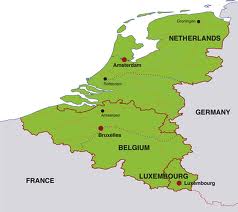Benelux
|  |
Name: Benelux | |
Acronym: | |
| Year of foundation:1958 | |
| Headquarters: Bruxelles | |
| Benelux documents: go to page | |
| Official web site: go to page | |
FOCUS ON | |
| Benelux Parliament |
Description
The Benelux is an economic union created by Belgium, the Netherlands and Luxembourg, headquartered in Bruxelles. Its aim is to strengthen the relations among the three states and to be a platform for the advancement of the European integration process.
Member countries:
The Benelux has three member states, namely:



Brief history
As a response to the emerging reconstruction needs of post-war Europe, in February 1958 Belgium, the Netherlands and Luxembourg launched an economic union at The Hague. It was a major achievement which reflected an idea of integration already developed in the twenty-year period between the world wars through a series of commercial initiatives. This was consolidated after the last conflict with the creation of a customs union in 1947. For countries such as those of the Benelux, which have small territories but are rich in valuable raw materials, inaugurating a form of closer cooperation was indeed the only way to gain influence at continental level.
Recent history
Faced with both global and continental changes as well as the expiry of the constitutive Treaty (2008), the Benelux countries have felt the need to define new objectives, so that, in the contest of an enlarged Europe, their union may continue to be a forum of ideas and suggestions for the advancement of a Community project. The risk of being marginalized after the opening up of the Union to Eastern European countries has led Belgium, the Netherlands and Luxembourg, as co-founding countries of small to medium stature, to establish a broader basis for their cooperation that goes beyond the economic field. This means introducing into their dialogue platform issues such as immigration, security and energy. In particular, this implies an institutional revision to strengthen the legislative role of parliament to help address the lack of democracy that still plagues the EU and international organizations in general.
The Benelux structure and decision-making procedures
The Parliament
The Inter-Parliamentary Consultative Council, created in Bruxelles in 1955, is composed of forty-nine members from national parliaments (twenty-one representatives each for Belgium and the Netherlands, seven for Luxembourg), who meet three times a year in plenary sessions. The assembly has a seat and a presidency which change on a two-year rotation basis; however, its Secretariat has a fixed seat in Bruxelles and is represented by a parliamentarian of Belgian nationality. There is also a Steering Committee composed of the rotating president of the parliament and two vice-presidents. This institutional body is also part of a Standing Committee in which is supported by presidents of the working commissions and political group leaders. The parliamentary institution of the Benelux has a purely consultative function: on the basis of prevailing opinions among the several national assemblies, it issues recommendations to governments in order to encourage the harmonization of legislation among member states, to promote a working economic union and also to strengthen cultural ties and cooperation on foreign policy.
The Committee of Ministers
The Committee of Ministers is the main decision-making body and consists of three government representatives from each of the countries, who have the task of overseeing the implementation of the constitutive Treaty and ensuring the fulfilment of its objectives. Government delegations are generally constituted by the Minister of Foreign Affairs, the Minister of Economy and Finance and the Minister of Social Affairs.
The Court of Justice
The Court of Justice, composed of judges from the highest courts of each of the countries, carries out the task of ensuring a uniform interpretation of common rules of law set in ministerial resolutions.
Decision-making within the Benelux
All decisions are taken unanimously and are binding but without immediate effect, as they must first be transposed into national administrations. The abstention of one member state does not prevent decision-making.

